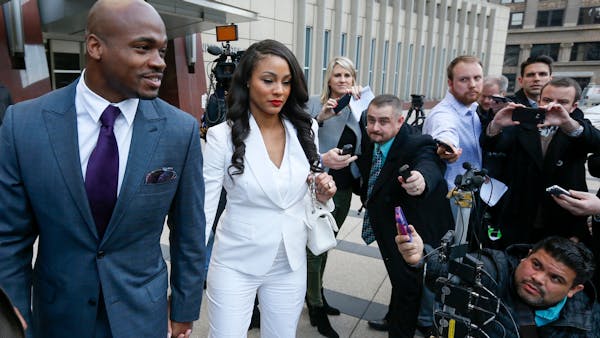The NFL began its offseason with a bang in the afterglow of a Super Bowl for the ages. The league staged quite the celebration this week.
One player was arrested and cited for allegedly punching a pizza delivery driver over a parking spot.
Another player was arrested after a traffic stop found him in possession of a gun and drugs.
A star receiver was suspended for one year for violating the league's substance abuse policy.
An overhyped rookie quarterback announced he has entered a rehab treatment facility.
A Hall of Fame player turned broadcaster was arrested for solicitation of a prostitute and assault.
Three organizations are under investigation by the NFL over potential "game integrity" violations.
A star running back's lawsuit against the NFL over discipline in a child abuse case landed in a Minneapolis courtroom.
We miss anything?
It's been another tough week for the league's image. And yet we can't stop talking about the Seattle Seahawks' boneheaded decision to pass from the 1-yard line instead of giving the ball to Marshawn Lynch.
That sums up the 2014 season.
The NFL provides a fascinating study into the relationship between brand appeal and fan tolerance of boorish behavior. Sometimes it feels like a love-hate relationship.
The league had a miserable season in public relations. Negative news hit like an avalanche. A series of high-profile cases stained the league's image and caused us to throw up our hands in disgust.
Yet the NFL's popularity continued to soar. Fans, by and large, didn't tune out.
More than 114 million people watched the Super Bowl, making it the most viewed TV program in U.S. history. The playoffs and even a few regular-season games also drew their highest ratings since the 1990s, according to longtime sports media/TV columnist Ed Sherman.
Fans and followers of the NFL have displayed a remarkable level of patience for nonsense. The events this season caused anger and disappointment and, at times, overshadowed what happened on the field. But how many people actually gave up on the NFL?
Who knows, maybe more than we think. A newspaper colleague said this week that he's stopped watching NFL games because he considers it "immoral," knowing the damage players inflict on their bodies and brains.
Perhaps others feel the same way. The guess here, though, is that the vast majority of fans were repulsed by what happened off the field this season but remained loyal because of their emotional attachment to the NFL. The product, presentation and marketing of the game combined with the explosion of fantasy football have made the NFL ingrained in our culture.
Herm Edwards, former coach and current analyst for ESPN, nailed the issue during an appearance on his network this week.
"We've got an image problem, there's no doubt about it," Edwards said. "[But] we don't have a viewer problem. There lies the problem."
Edwards is correct in his assessment that an image problem really isn't a problem unless it affects the bottom line. As long as fans and sponsors remain devoted in their time and money, Commissioner Roger Goodell's beloved "shield" can withstand the dents of scandal and controversy.
Maybe we've come to expect occasional screw-ups. Or we're able to compartmentalize the actions of bad apples because we love the game and the enjoyment of Sunday afternoons.
David Schwab, a senior executive with the global sports and entertainment marketing firm Octagon, specializes in branding. Schwab views the NFL's history and emotional connection with fans as a gravitational pull that allows the league to survive blowback when problems arise.
"There's goodwill and fandom in the sport," Schwab said. "You want brands and properties and individuals to succeed. So when there are problems or challenges, you don't love it, but you stay with them."
Schwab believes that once the immediacy of the news cycle fades, fans tend to focus more on individuals or teams "so it's less of a global sport issue."
The NFL certainly tested that threshold in the past year.
A video surfaced of Ray Rice punching his fiancée. Adrian Peterson faced child abuse charges for whipping his son. Goodell acted like a dunderhead in his decision-making. Questionable officiating and underinflated footballs dominated headlines in the postseason.
The league lived in crisis mode.
The Super Bowl thriller provided a dramatic ending and different narrative and gave us something to digest for months. (Seriously, Pete Carroll, a pass in that situation?)
That's the grip of the NFL. It enthralls us and, unfortunately, sometimes it infuriates and disgusts us. Either way, we keep watching and talking about it.
Chip Scoggins chip.scoggins@startribune.com

Scoggins: Adofo-Mensah meets draft night challenge in a big way

Scoggins: Worried about costly trade to draft a quarterback? Don't be.
Scoggins: 'Wait one more year' can't be the Wild's plan. Thankfully, it isn't.


